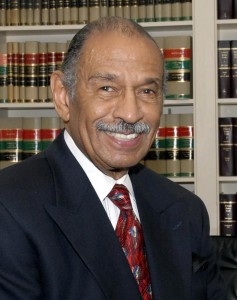
By U. S. Rep. John Conyers, Jr. (D-Mich.)
(TriceEdneyWire.com) – At a time when our nation needed its legal community to step forward and join in the struggle for equality, the Lawyers’ Committee for Civil Rights Under Law was born. I was privileged to be present in the East Room of the White House on the day that President Kennedy urged a group of 244 lawyers to use their training and influence to further the goals of the civil rights movement.
Within weeks, the formation of the Lawyers’ Committee was announced as attorneys from around the country heeded the call of the President. Fifty years later, the Lawyers’ Committee remains in the vanguard of both domestic and international initiatives to protect the rights of diverse communities.
While there is no question that America has made substantial progress over the last 50 years in creating a more just society, we cannot say that serious challenges to achieving the American dream do not exist for large segments of our society. I ran for Congress in 1964, a time when we battled Jim Crow era poll taxes and institutionalized discrimination.
In those days, the battle lines were clearly drawn and easy for anyone to see. Successful litigation and legislation have largely ended the practices of institutional discrimination and the Lawyers’ Committee has played an important role. However, as the civil rights movement has expanded beyond race, we have seen a return of discriminatory practices that continue to challenge the goal of equality under the law.
The institutional memory found at the Lawyers’ Committee is vital to ensuring that our society is not revisited by old discrimination in a new package. Its work during the 2012 election cycle, for example, was critical in protecting the voting rights of millions of Americans.
Just as Jim Crow era poll taxes were designed to erect barriers to the ballot box, the current wave of voter purging, citizenship and identification schemes were intended to make it difficult for young, minority and older Americans to equally participate in the political process. This organized and well-financed campaign to subvert the election process is ongoing and will require a combination of litigation and legislation to ensure that our campaign finance system and election laws reflect the important principle of equal participation in the political process.
While voting rights remain the touchstone in the quest for equal rights, millions are fundamentally deprived of their basic liberty by a criminal justice system in a race to incarcerate. The United States has the largest prison population in the western world, with 2.25 million people behind bars. This figure illustrates the greatest inequality facing the nation. Sadly, more than 60 percent of the people in prison are now racial and ethnic minorities.
For the African-American community, these statistics are devastating, with one in every 10 Black men in their 30s in jail or prison on any given day. A felony conviction can stifle economic independence by restricting voting rights, job prospects and access to government- sponsored training programs and subsidized housing. In communities already devastated by unemployment and a lack of educational and economic opportunity, the prison pipeline has created a lost generation.
As progressive advocates like the Lawyers’ Committee move to address inequality in the 21st Century, the outstanding question for me is whether Congress can shift its focus to tackle the root causes underlying poverty. I fear that the drive to cut blindly entitlement programs – from the Second Chance Act to Head Start and Community Services Block Grants – runs the serious risk of exacerbating the economic isolation of poor communities and their related civil rights burdens.
Ultimately, we must act to break the persistent link between poverty and the criminal justice system. Ending inequality in America is a battle that can be won, and although the barriers are still largely the same as those of the 1960’s, our approach in the 21st century must not lack the strength and courage which brought us those earlier victories.
U. S. Rep. John Conyers, Jr.,(D-Mich.), known as the dean of the Congressional Black Caucus, has served in the U. S. Congress since 1965. This article – the fourth of a 20-part series – is written in commemoration of the 50th Anniversary of the Lawyers’ Committee for Civil Rights Under Law. The Lawyers’ Committee is a nonpartisan, nonprofit organization, formed in 1963 at the request of President John F. Kennedy to enlist the private bar’s leadership and resources in combating racial discrimination and the resulting inequality of opportunity – work that continues to be vital today. For more information, please visit www.lawyerscommittee.org.




